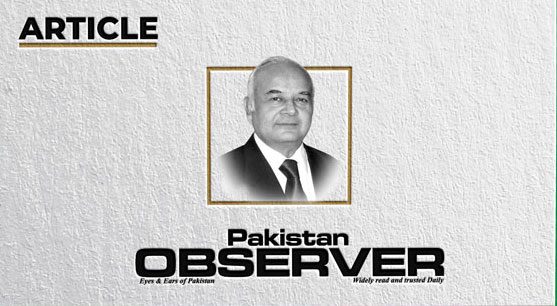Emergency suggestions to save the sinking ship
REASONS of past failures: All past Pakistani civil and military rulers always focused on the longevity of their governments.
Thus, resulting in putting the cart before the horse i.e., personal interest before the development of the country.
Our rulers failed to plan for the future, which has in fact, taken Pakistan backwards; as in the economic race, if a nation is not moving forward, it is sliding backwards.
Nations can survive military occupation, but cannot survive economic collapse, as witnessed in the formation of 15 new states after the break-up of the Soviet Union in 1991, whose formidable military-might was hapless to keep the country united.
As such, all current Pakistani civil and military leadership at the helm of the national affairs must clearly understand that, if no selfless emergent corrective actions are initiated, this sinking ship, Allah forbid, will not take long to touch the bottom of the sea.
Suggested steps for economic resurrection of Pakistan: Unity of the nation is the need of the hour.
Currently, no single political party or institution of Pakistan has the capacity to unite the nation, single-handedly.
Moreover, the current extremely grave economic crisis of Pakistan will not allow any further waste of time and resources in the luxury of a caretaker government, which after another 90 days will be bound to hold fresh elections.
Here, we must remember that expecting a different result by doing something again and again, without any change, is sheer insanity.
And assuming, even if any party after the elections gets a simple or two third majority, we know very well that somehow, our political parties badly lack the required capable manpower, resources, will, capacity and planning to steer Pakistan out of this extraordinarily serious economic crisis.
Although, today it looks like an economic crisis for Pakistan, but in fact, it is a structural defect of our entire economic, political, judicial and governance systems installed to serve the elite of Pakistan which was almost half percent of our total population, that needs an immediate overhaul and revamping; and no amount of funds from IMF or friends and not even the best finance minister on this planet, can rescue Pakistan from this almost existential financial and security crises without overall reforms in almost every sector of society.
In this regard, Pakistan immediately needs a government (we may call it a national government or government of experts) which must be totally free of any influences of mafias and lobbies (foreign and local), because, that government will have to immediately embark upon the following extremely gigantic tasks:
• Reforms to induct meritocracy in the civil, military and judicial bureaucratic systems with its motto ‘Recall the face of the poorest and the weakest person whom you may have seen and ask for yourself if the step you contemplate is going to be of any use to him.’
• Taxation reforms with particular reference to digitalize the system to minimize corruption
• Reforms in the governance system by making every division of the country an independent unit or province with maximum possible financial and administrative control.
In this regard, we can take a clue from the Swiss Federal Constitution which declares the cantons to be sovereign to the extent that their sovereignty is not limited by Federal.
Areas specifically reserved to the Confederation are the armed forces, currency, the postal service, telecommunication, immigration into and emigration from the country, granting asylum, conducting foreign relations with sovereign states, civil and criminal law, weights and measures, and customs duties.
Each canton has its own constitution, legislature, executive, police and courts. Similar to the Confederation, a directorial system of government is followed by the cantons.
• Change of elections system wherein, before elections all political parties shall declare along with their manifestos, for the next four years term, a list of best capable deserving and honest persons for the judgment of the general public, which shall vote only for that Party and not for the individuals.
After the results of voting (to be held on EVM) every party should have representation according to their percentage of votes and the party getting the maximum percentage should be allowed to form the government.
In this way, for example if a party gets 30 percent votes, the top 30 percent members notified in its list shall be automatically elected for the assembly and there will be no voting for each member’s election.
Since, general public is crushed with almost daily increase in prices of every item, because businessmen increase their profits un-proportionately to the actual increase of prices of all such items (notwithstanding that some of them also indulges in thefts of national resources of water, electricity and gas in connivance with the employees of these utilities) like mineral water, POL marketing companies, textiles, cement, flour, wheat, cotton, rice, fertilizers, pesticides, transport, aviation, steel, automobiles, educational institutions charging exorbitant amounts of fee and all items connected with masses, it is proposed to counter this emergency situation, which is virtually killing (economically and otherwise also) the general public: A law with system and procedure must be devised to nationalize all such industries and businesses in the larger national interest.
Yes, there will be lots of hue and cry, but let us now build a Pakistan for the poor also; because the best capitalist system failed in our country for the last 75 years to serve the 99.5 percent have-nots.
Subsequently, we must devise a 50 years development plan for Pakistan, divided in 10 plans of five years each, in consultation with every stakeholder, particularly, the weakest sections of our society, like the farmers, labourers, women and the minorities.
This plan should be sacrosanct like our constitution and can be improved with the needs of times, but no political or other party can shelve it.
—The author writes on strategic, political, economic, current affairs & sports.









